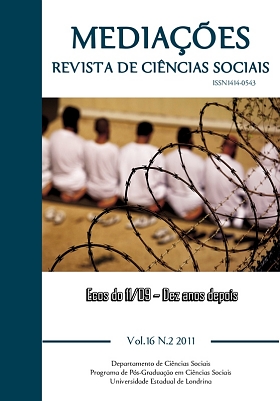Security and the ‘war on terror’: a review of contemporary literature on Latin America after September 11
DOI:
https://doi.org/10.5433/2176-6665.2011v16n2p51Keywords:
Security politics, “War on terror”, Latin America, U.S.AAbstract
The objective of this article is to revise and systemize part of the Anglo-Saxon academic bibliography on public security and how this literature views the role of the U.S.A. in Latin America, in the post-September 11 scenery. The conversion of the “war on terror” into programmatic and structuring pivot of bilateral relations established by the U.S.A. with other countries brought modifications in the formulation and implementation plan of security policies in several countries of the globe. These modifications influenced the formulation and model of public security policies - whether they are adopted internal policies for the North-American society, or security policies of the countries that relate (and those who don’t relate) with the United States government. This revision, therefore, analyzes the texts produced between the years of 2001-2010 on the theme of thus the so-called “war on terror” and Latin America.Downloads
References
CALDEIRA, Teresa; HOLSTON, James. Democracy and violence in Brazil. Comparative Studies in Society and History, Cambridge, v. 41, n. 4, p. 691-729, 1999.
GODOY, Angelina. Converging on the poles: contemporary punishment and democracy in hemispheric perspective. Law & Social Inquiry, Chicago, v. 30, n. 3, p. 515-548, 2005.
HERZ, Mônica. Política de segurança dos EUA para a América Latina após o final da Guerra Fria. Estudos Avançados, São Paulo, v. 16, n. 46, p. 85-104, 2002.
HUME, Mo. Mano Dura: El Salvador responds to gangs. Development in Practice, San Salvador, v. 17, n. 6, p. 739-751, nov. 2007.
KARSTEDT, Susanne; LAFREE, Gary. Democracy, crime, and justice. Annals of the American Academy of Political and Social Science, Philadelphia, v. 605, p. 6-23, may, 2006.
LANGER, Maximo. Revolution in Latin American criminal procedure: diffusion of legal ideas from the periphery. American Journal of Comparative Law, Baltimore, v. 55, n. 4, p. 617-676, 2007.
MANN, Michael. The Crisis of the Latin American Nation-State. In: CONFERENCE THE POLITICAL CRISIS AND INTERNAL CONFLICT IN COLOMBIA, 2002. Bogotá. Paper presented...Bogotá: University of the Andes, 2002. p. 10-13.
MATTEI, Ugo. A theory of imperial law: a study on us. Hegemony and the Latin resistance. Indiana Journal of Global Legal Studies, Bloomington, v. 10, n. 1, p. 383-448, 2003.
UNGAR, Mark. Prisons and politics in contemporary Latin America. Human Rights Quarterly, Cincinatti, v. 25, n. 4, nov. 2003.
UNGAR, Mark. Latin America’s police: advancing citizen security? Princeton University Workshop: Violence and citizen in post-authoritarian Latin America, mar. 7, 2008.
WHITAKER, Beth. Exporting the patriot act? Democracy and the ‘war on terror’ in the third world. Third World Quarterly, London, v. 28, n. 5, p. 1017-1032, 2007.
ZULUAGA, Jamie; STOLLER, Richard. U. S. security policies and United States Colombia relations. Latin American Perspectives, Newbury Park, v. 34, n. 1, p. 112-119, Jan. 2007.
Downloads
Published
How to Cite
Issue
Section
License
Copyright on articles published in Mediações belongs to the author(s): in the case of partial or entire republication of the original publication, we ask author(s) to indicate the original publication in the periodical.
Mediações uses the Creative Commons Attribution 4.0 International license, which allows Open Access, enabling any user to read, download, copy and disseminate its content so long as adequately referenced.
The opinions expressed by the author(s) are their sole responsibility.
































